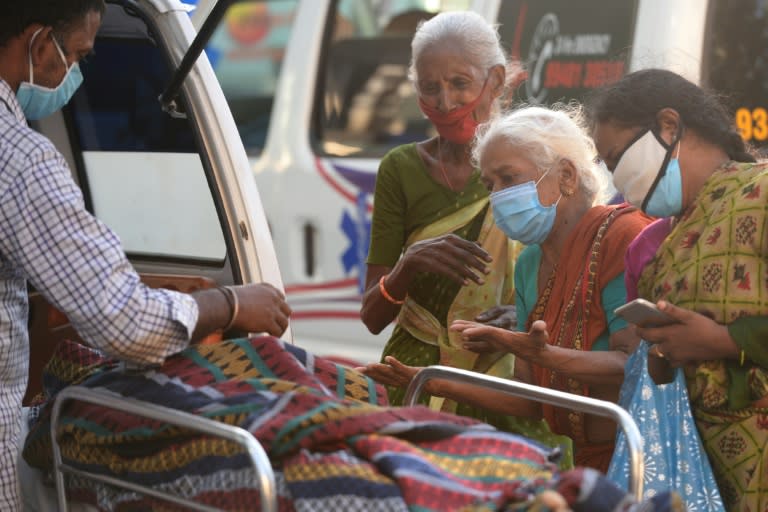India announced on Thursday a record of nearly 4,000 deaths from Covid-19 and 412,000 new infections in 24 hours, while authorities warn the country must prepare for “new waves”.
Data from the Ministry of Health show 3,980 deaths and 412,262 daily cases, bringing to 230,168 deaths and 21.1 million infections the figures recorded in total in India since the start of the pandemic. Some experts consider them to be largely undervalued.
This new record follows several days of decline in the number of cases which had encouraged hopes that the outbreak recorded since the end of March would ease. After a peak of 402,000 daily contaminations last Friday, it fell slightly to 357,000 before rising again on Tuesday.
According to specialists, the worst is still to come for this country of 1.3 billion inhabitants, with an epidemic peak which may not be reached for several weeks.
– An “inevitable third episode” –
K. Vijay Raghavan, principal scientific adviser to the Indian government, warned Wednesday evening that a “3rd episode was inevitable given the high levels” of current contaminations.
“But it is not clear exactly when this third episode will occur. We have to prepare for new waves,” he told a press conference.
However, the government of Prime Minister Narendra Modi refuses to order generalized containment. Several regions, including the capital New Delhi as well as the states of Bihar and Maharashtra, have confined themselves.
Other states such as West Bengal and Karnataka are also reporting sharp increases in contamination, as is Kerala, whose Prime Minister Pinarayi Vijayan announced a week of confinement on Thursday.
Its management of the health crisis has earned the central government more and more criticism, including before the courts, given the dramatic situation in which the dilapidated and underfunded health sector is facing with patients in distress. respiratory dying at the gates of saturated hospitals, short of oxygen and essential medical supplies.
On the night of Wednesday to Thursday, eleven people lost their lives in a hospital near the city of Chennai (former Madras), in the south of the country, due to a drop in pressure in the oxygen pipes. , the Times of India daily reported Thursday.
“Admissions are suspended indefinitely,” for lack of oxygen supply, tweeted Devlina Chakravarty, general manager of Artemis hospital in Gurgaon, near New Delhi.
– Politicians in “ivory towers” –
The Delhi government has said it needs 700 tonnes of oxygen per day for its hospitals, but the Supreme Court heard on Wednesday that just 585 tonnes would be deployed. Faced with the threat of contempt of court proceedings, central government lawyers argued that Delhi only needed 415 tonnes.
The Court gave the government until Thursday morning to present a plan to send additional supplies. The Delhi High Court accused politicians and government officials of “living in ivory towers”.
The Allahabad High Court in the state of Uttar Pradesh, for its part, ruled that leaving so many people to die was “a criminal act and not less than genocide”.
Hospitals in Calcutta, Bangalore and other major Indian cities are also reporting severe shortages.
In the face of growing anger, the Central Bank on Wednesday announced $ 6.7 billion in subsidized loans intended for manufacturers of oxygen, vaccines and drugs, as well as hospitals.
Shipments of foreign emergency medical aid, including oxygen generators and respirators, have poured in over the past ten days including from the United States, Britain and Europe.
But India will need even more oxygen in the face of the expected influx of patients until the situation stabilizes, another government official said on Monday, calling on the international community to continue to help the country.
“We did not have and still do not have enough oxygen,” the senior official admitted, on condition of anonymity, “if we had more oxygen, more lives would be saved.”
The International Federation of Red Cross and Red Crescent Societies called for “urgent” international action to prevent “a deepening humanitarian catastrophe” across South Asia.
bur-lth / lch
–


